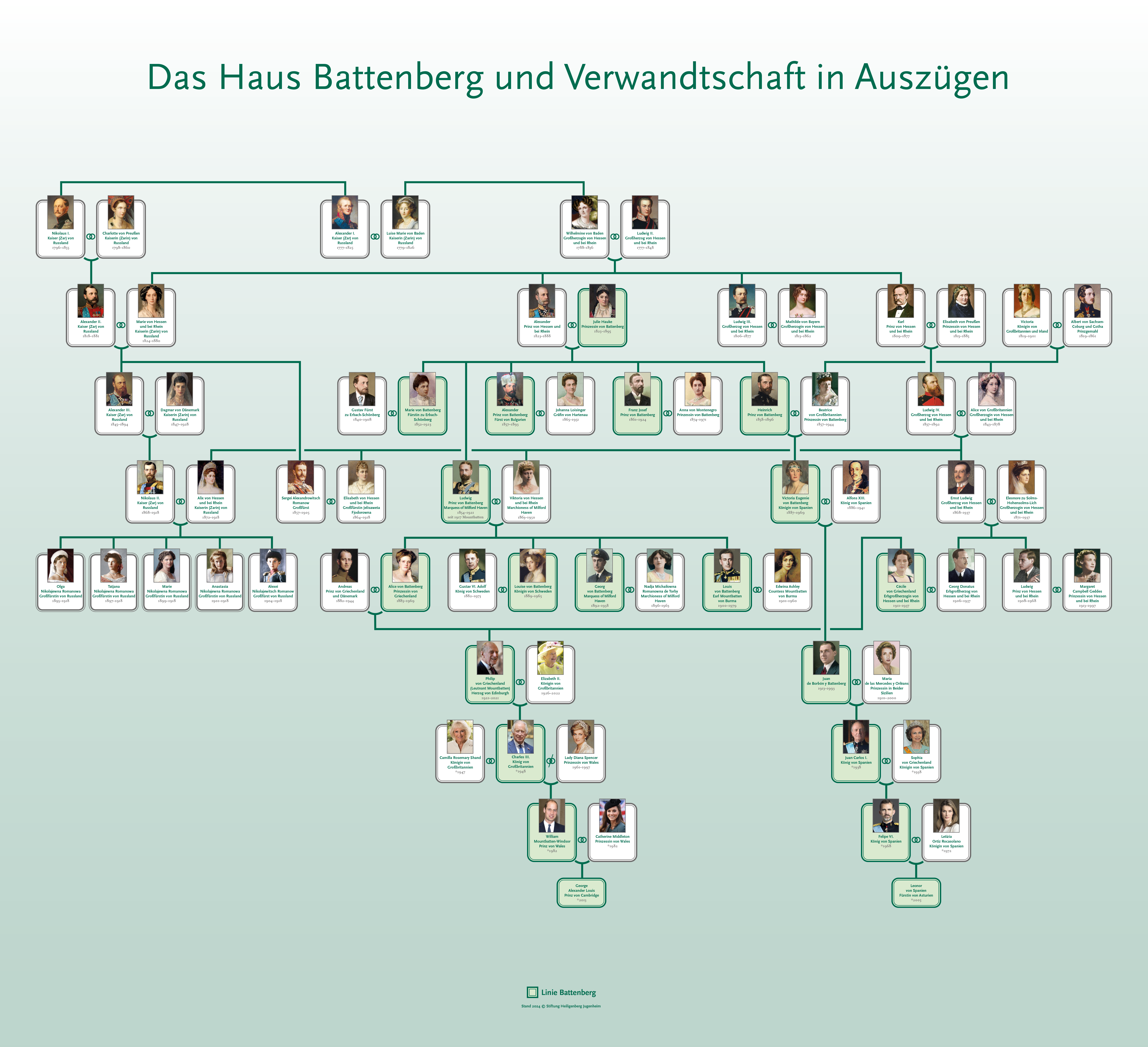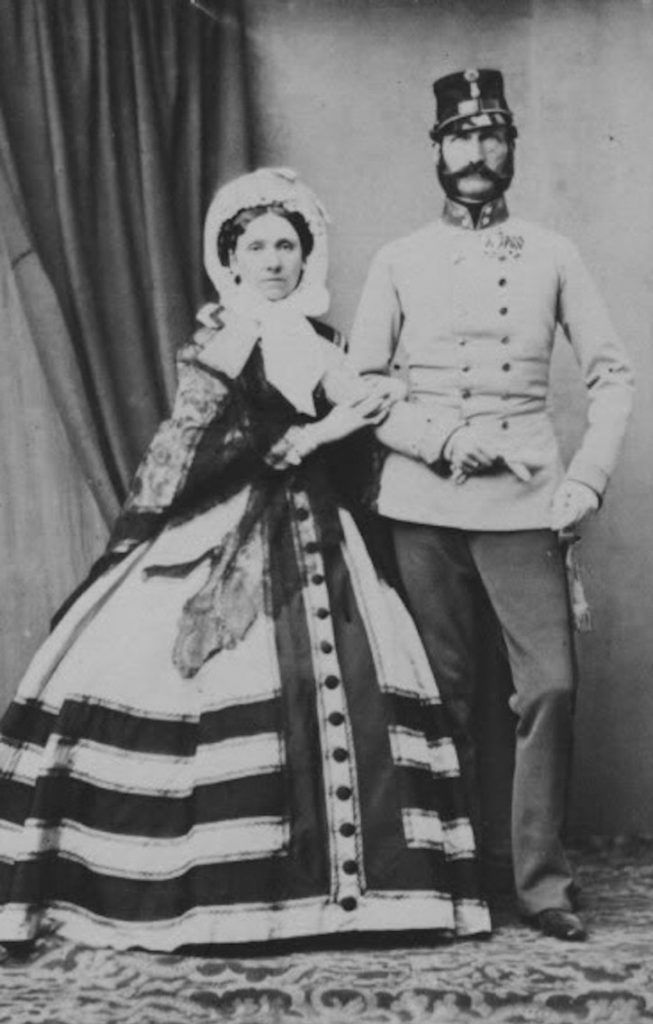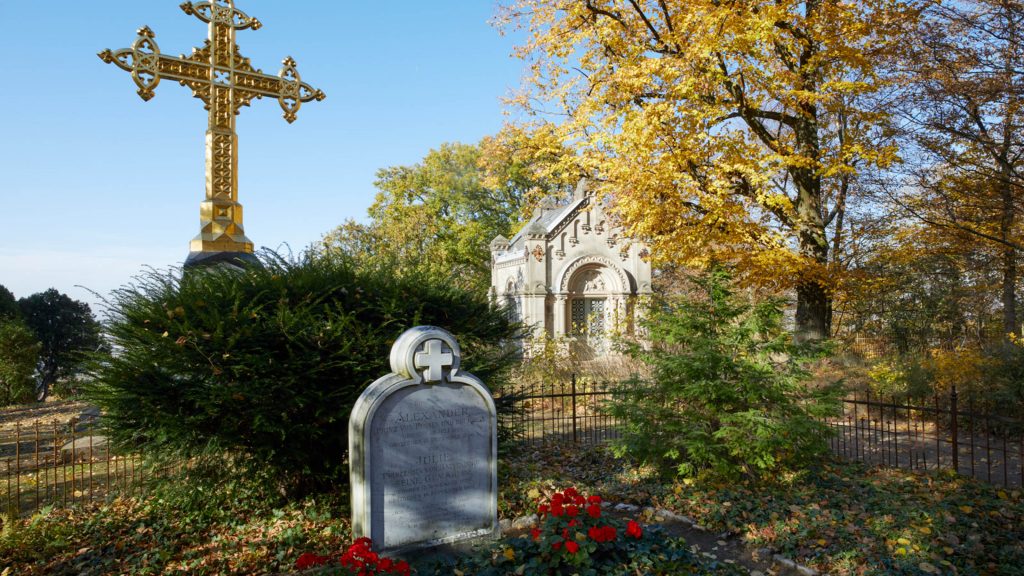The Battenbergs – A European Family.
If we go back to the time between the Congress of Vienna (1814-1815) and the outbreak of the First World War, we experience Heiligenberg in Jugenheim as the reference point of a family that can be considered European in the true sense of the word. It appeared by a turn in fate from nowhere, spread its wings across major countries of Europe, only to disappear from Heiligenberg less than 100 years later.
It was hereditary Grand Duchess Wilhelmine, the wife of the later Grand Duke Ludwig II of Hesse and by Rhine, who acquired Heiligenberg in 1827, thus laying the foundation for a glorious era of this wonderfully scenic place on the Bergstrasse. Her children, Alexander Prince of Hesse and by Rhine with his wife Julie Princess of Battenberg and his sister, Marie, with her husband Tsar Alexander II, set the dazzling development of this place into motion. On the one hand, Heiligenberg became a meeting place for the high nobility and influential European politicians, whereas, on the other, the members of the family took on the tasks and challenges of the time which were presented them from all corners of the continent. Thus Heiligenberg became the starting point of this family active throughout Europe.

The Battenbergs

Alexander Prince of Hesse and by Rhine was a brother of Grand Duke Ludwig III. The prince married Julie von Hauke, one of his sister’s chambermaids in the Russian court. However, Julie von Hauke was not a suitable match for a Prince of Hesse and by Rhine and hence not able to bear his title of nobility. Therefore the Grand Duke set about looking for a suitable solution and came up with the name of a long dormant noble family from the north Hesse town of Battenberg. The Grand Duke appointed his sister-in-law Julie as Countess of Battenberg, and a few years later as Princess of Battenberg.
The happy marriage of Alexander Prince of Hesse and by Rhine and Julie Princess of Battenberg produced five children who all carried their mother’s title and were Princesses and Princes of Battenberg as they were not entitled to inherit in the Grand Duchy of Darmstadt. This is reflected in the Battenberg coat of arms where the symbol of rule or power, a sword, is not depicted.
Marie Caroline Princess of Battenberg (1852 – 1923)
The eldest child of Julie and Alexander married Count Gustav von Erbach-Schönberg (1840 – 1908) in 1871, who was elevated to the rank of prince in 1903. Princess Marie is still remembered today for her social engagement. In her comprehensive memoirs, the first family memories of the Battenbergs, she tells of her childhood and youth on Heiligenberg and describes her experiences on her journey to Bulgaria where she visited her brother Alexander, the then Prince of Bulgaria.
Louis Alexander Prince of Battenberg (1854 – 1921)
From childhood onwards Alexander’s brother Prince Ludwig showed an inclination for seafaring. In 1868 he became a naval cadet in the Royal Navy in Portsmouth, aged only 14. In 1891 he was appointed Captain, in 1905 Rear-Admiral and in 1908 Vice-Admiral of the Atlantic Fleet. Then in 1912 he was promoted to First Sea Lord and Commander-in-Chief of the Royal Navy, but had to resign soon after the outbreak of the First World War because of his German ancestry. In 1917 he anglicised his German name to Mountbatten after King George V followed public opinion and was appointed Marquess of Milford Haven. In 1918 he was discharged from the Royal Navy against his will.
In 1920 he sold the Heiligenberg estate due to financial difficulties. On 11th September 1921 he died in London of heart failure after a spell of influenza. The funeral service took place in Westminster Abbey and his remains were buried at St Mildred’s Church, Whippingham on the Isle of Wight.
His marriage in 1884 to Princess Victoria of Hesse and by Rhine (1863 – 1950), a daughter of Grand Duke Louis IV and granddaughter of Queen Victoria of England, created a double lineage of their children.
Alexander Joseph Prince of Battenberg, alias Prince of Bulgaria,
alias Graf von Hartenau (1857 – 1893)
In his youth Alexander was a pupil at the Ludwig-Georgs-Gymnasium in Darmstadt. He joined the 2nd Grand Ducal Hessian Dragoon Regiment as a lieutenant and took part in the Russian-Ottoman War in Bulgaria in 1877 (1877/78). Soon afterwards he was transferred to Berlin.
As a result of the Congress of Berlin (1878), the autonomous Principality of Bulgaria came into being. Because of several reasons but above all Alexander’s participation in the campaign against the Ottomans and his close relationship with Tsar Alexander II of Russia, whose nephew he was, he was a logical candidate for the head of this new principality, which was to remain under the influence the Russian Tsar. After his nomination he was unanimously elected Prince by the Bulgarian National Assembly on 29th April 1879 and set up his residence in Sofia.
After the Peace Treaty of Bucharest with the Serbs on 3rd March 1886 the call for a reunified Bulgaria became louder. But the Russian Tsar Alexander III was not in agreement and would refuse to recognise him as ruler of a potentially enlarged state and retracted his whole support for his cousin. This anti-Alexander atmosphere caused him to be forced, in a cloak-and-dagger operation, to abdicate and was even abduct by force. On 7th September, 1886, after numerous discussions and attempts to consolidate his rule, Alexander officially renounced his rank to the citizens of Bulgaria and returned to Darmstadt.
After this great disappointment Alexander decided to withdraw from the political stage. He rejected his Battenberg title of nobility and took on the name of Graf von Hartenau. The Prussian Emperor Wilhelm I together with Bismarck thwarted Alexander’s planned marriage to the Prussian Princess Viktoria. In 1889 he married the Austrian opera singer Johanna Loisinger (1865 – 1951) after getting to know her at the court theatre in Darmstadt. After their secret marriage in southern France they withdrew from the public eye and settled in Graz where Alexander joined the Austrian Imperial and Royal Army and they founded a family.
Alexander died young of appendicitis in Graz on 17th November 1893. According to his wishes, at the request of the Bulgarian government, his body was transferred to Sofia and laid to rest in a magnificent mausoleum especially erected for him as the first prince of modern Bulgaria.
In almost every Bulgarian town there is a street named Battenberg, after Alexander I, Prince of Bulgaria.
Henry Maurice Prince of Battenberg (1858 – 1896)
The army officer married Princess Beatrice, Queen Victoria’s youngest daughter, on 3rd July 1885 on the Isle of Wight. He was immediately given the British citizenship and became governor of the Isle of Wight. On an expedition to Africa where he wanted to fight in the Ashanti war he contracted malaria from which he never recovered. His body was returned to England where he was buried in Whippingham Church on the Isle of Wight. Together with Victoria, who died many years later, his sarcophagus can be viewed still today in the church in the Battenberg Chapel.
The couple had three sons and a daughter, Princess Eugenie Victoria (1887 – 1969), who was married to King Alfonso XIII of Spain from 1906. The former King of Spain Juan Carlos I is her grandson, Felipe her great-grandson.
Francis Joseph Prince of Battenberg (1861 – 1924)
Francis was more of an academic and became a doctor of philosophy. He assisted his brother Alexander as an advisor in Sofia and was abducted with him. After being rebuffed by Consuelo Vanderbilt, he married Princess Anna of Montenegro (1874 – 1971) in 1897. The marriage remained childless.

Since 1902, the progenitors of the Battenberg/Mountbatten family have rested side by side in a grave in front of the Golden Cross in the grounds of Heiligenberg Castle, in accordance with their wishes. Placed on their grave is a memorial stone for their grandson Louis, Earl Mountbatten of Burma, who spent time at Heiligenberg as a young boy and was murdered by the IRA in Ireland in 1979. The late Prince Philip, Duke of Edinburgh and husband of the British Queen Elizabeth II, who once visited Heiligenberg Castle in 2005, was his nephew.
